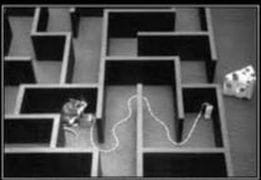 How many articles have you read that began with some variation on the proposition: “weight control is confusing, and this article will clear up the confusion for you,” and yet the result is just more confusion. So, if I were to say that this article aims to “once and for all” clear up the confusion, I would hope that your completely rational response would be to stop reading immediately. Therefore, I shall make no promises of that sort! We all know one thing and that is that weight control is hard, even if we may disagree about what makes it so. Let’s quickly run through some of the most important reasons: 1. The environment is a minefield of temptations, both healthy and unhealthy, and often we are faced with too many choices and an overabundance of food (yes, there are still too many hungry people on the planet, but that is a different problem). 2. Social relations often revolve around food, especially holidays, celebrations, romance, watching sports, playing sports (“beer hockey, anyone?”) ….and I could go on. 3. Too many cars and not enough walking. 4. Obesity is in some sense a self-perpetuating condition, with metabolic, psychological, and social adjustments that tend to promote continued weight gain. 5. The very idea that weight control should be easy, which brings us back to the influence of the media and the weight loss industry, always ready to sell us the latest “answer,” which only encourages wishful thinking and short-lived efforts to lose weight. Once we accept the evidence that weight loss is hard, is the intelligent choice to give up and go with the flow? It is possible after all that the pharmaceutical industry will come up with a pill allowing us to overeat, remain sedentary, but stay thin and perfectly healthy…. just when is that pill scheduled for release? No, I think the answer inevitably comes back to the time-tested method summed up in classic quotes such as “slow and steady wins the race,” and “a journey of 1000 miles begins with a single step,” or even “moderation in all things, even moderation.” The point is to envision a desired future and start moving in that direction, and to keep moving even if at times progress is slow, backsliding can happen, and the results are less than anticipated…. keep moving forward because the alternative is worse! So, we begin the year with the resolution to make things a little bit better, to prevent things from getting worse. Knowing things could be worse, and likely will be unless we create something new through our determined efforts may sound like a “pessimist’s guide to goal setting” but reminds me of one of my favorite books, Paul Watzlawick’s classic “The situation is hopeless, but not serious.” This is not pessimism, but realism, and a different kind of optimism that says that it is within our capacity to shape our future and ourselves, if only we make the choice. Wishing all a healthy and successful 2017! Stephen Stotland, Ph.D.  When is the right time to start working on better weight control? For some people the idea of starting a few days before Christmas sounds impossible, and they will instead work on a New Year’s resolution, vowing to leap into action as soon as the holidays are over. Their attitude is, “have fun now, pay later,” like those who run up big credit card bills buying gifts they can’t really afford. Now, my intention in this essay is surely not to be a Grinch. It’s important to have fun and share good times. My question is whether we can have a good time but still practice new habits? To answer this question, we need to look more closely at the concept of habit. Habits are behaviours that take place in response to specific “cues” (remember Pavlov’s dogs); they feel automatic and in some sense “driven” – that’s why the concepts of habit and addiction are overlapping and somewhat difficult to tease apart. Habits can be healthy (e.g. brushing your teeth) or unhealthy (e.g. overeating), but in all cases, have the feeling of being a part of us. To change a habit, we must pull ourselves away from what feels natural. Back to the holiday question, imagine your pattern of holiday eating in years past, and think of all the cues that trigger it. Perhaps it’s the big display of traditional foods, things you only have a chance to eat once a year. Perhaps it’s your friends and relatives offering, or even pushing, you to eat, eat, eat. Perhaps it’s the quiet time you get to spend with yourself, eating while watching too much TV. Your habits take place in a “predictable” scenario of place, people, food, mood, and motivation (the “why” of your eating). So, what’s a good goal if you decide to make a change this year? I would suggest making the smallest changes you can think of! A little less of this (e.g. sweets) and a little more of that (e.g. walks). Stay conscious of what you’re doing this year and how it’s just a little bit better than last year. Think about my “theory of behaviour change relativity,” which is, simply, that “it’s all relative,” meaning your behaviour this year relative to last year. The holiday season is an “opportunity” to get started on this process of 1. Identifying your habits, 2. Understanding the contexts in which they take place, and 3. Starting to make small changes. If you start making small changes in your habits now, just imagine where you’ll be by the NEXT holiday season. Happy holidays!! Stephen Stotland, Ph.D.  There are 7 stages of weight control which include the unmotivated stage, the concerned but disengaged stage, the contemplation stage, as well as the novice, intermediate, mastery and expert stages. In the unmotivated stage, the person does not recognize their weight problem, or thinks it is unimportant and not worth worrying about. From here one may move to a stage of being concerned but disengaged, realizing there's a problem, but not ready to think about it. As one begins to sense the importance of weight control one enters a contemplation stage, beginning to think more seriously about whether or not to attempt better weight control. During this stage, as they find more reasons to make the effort, and less reasons not to, the person gradually becomes more sure of their intention and closer and closer to implementing an action plan. As their analysis of the pros and cons shifts more to the positive and as the expectation of success increases, a decision is firmly made and the person moves from contemplation into action. Once moving into the action stage there is a long period of "apprenticeship" in which one acquires the needed skills and knowledge. In the early "novice stage", the person benefits from a clear structure and feedback. After 3 - 6 months of consistently practicing new eating and exercise behaviour the individual should have reached the "intermediate stage", with stable habits and greater flexibility. At this stage the person is quite confident about weight control and not disturbed by situational variations in behaviour. Thus, if one eats more or less "nutritious" food on some occasion, there is still a sense of moderation and therefore no fear, frustration or guilt, but instead a feeling of satisfaction and resilient confidence. Eventually, with enough practice and experience one may attain the "mastery stage," where the new habits are fully automatic and second-nature. From this stage there is still room for development, to the "expert stage." The expert can develop their own new ideas and can even teach others. Thus, the expert of weight control has both mastered his or her own weight, and can help others do the same. Many experts in weight control have overcome their own weight issue. Effective treatment can benefit from a knowledge and understanding of the stages. Different treatment strategies are appropriate for different stages. If the goal is to create "weight control experts" then treatment must go far beyond diets and exercise plans; there is need for a deeper analysis of motivation, skills, strategies and attitudes. The 7 stages of weight control provide a map of the weight control process. The higher one climbs in the stages the better the long-term prospects., but it's important to remember that one cannot become an expert without first being a novice, then intermediate and master. Stephen Stotland, Ph.D.  We must consider this question: do people really have a choice what they weigh? Can a 5' 8" 350 lbs. 45 year old man suddenly decide to lose half his bodyweight? Yes, he may make a decision, and set this goal for himself. Whether the decision is based on a realistic expectation of achieving the goal, or not, is another question. Basically, can this middle aged man, having achieved a severe degree of obesity, now achieve a normal body weight, with optimal health and functional ability? Thus, the real question is, is achieving a healthy weight within one's "self-control", or are forces beyond one's control simply too powerful? To answer this question I will make use of an analogy. The need to breathe is obvious to all, as within a few seconds of being deprived of air one begins to show ill effects. No one would suggest that not breathing is a choice. But even a function as automatic as breathing can be controlled at times and perhaps permanently altered through persistent efforts. We can slow our breathing, practice deep breathing, and engage in increased (aerobic) breathing (e.g. while running, climbing, lifting, swimming). We can also choose what we breathe (e.g. cigarette smoke, polluted air, fresh air). All of these "intentional" manipulations of breathing may have significant long-term effects. Similarly, eating is not a choice (we need to eat) even if the consequences of not eating come more slowly than those of not breathing. But clearly, if we have some control over breathing, then we certainly have some control over eating. It is within our power to choose when, where, what and how to eat. "Weight regulation" refers to the various processes determining one's actual bodyweight. Genetic factors affect metabolism, energy levels, athletic ability and enjoyment, food preferences and eating styles. Environment too is a strong influence on eating and activity behaviours. It is within those important contexts - one's genes and environment - that one engages in the "self-regulation" of weight. One chooses to be thinner, healthier, fitter, and then uses strategies to achieve the goal, but the outcome of such practices are influenced by genetics and environment. Here is where the capacity for self-awareness is important. An individual like our middle-aged gentleman can become more conscious of his body, mind and environment, and start using this self-awareness to guide a process of change and self-improvement. Small choices made consistently can gradually modify his physiology, mental programming and social situations, creating new habits and a new lifestyle. It truly does start with a choice, deciding to make the change. He may not become a model or an Olympian, but he will surely be healthier and feel better about himself. Stephen Stotland, Ph.D.  Eating disorders are self-destructive habits that take on greater and greater centrality and importance in the mind and life of the sufferer. As one progresses into a more active and severe eating disorder, one becomes more "restrictive" and/or "impulsive" in eating and exercise behaviour, and the more one's general emotional state is negatively affected. The weight control attitude associated with an active eating disorder is characterized by varying degrees of restrained (restricted) eating and disinhibition/binging, and more or less extreme weight loss goals. Different combinations of anorexic and bulimic behaviour patterns are possible. As people recover from eating disorders they become more flexible and moderate in their eating intentions and behaviour. The recovered patient remains more concerned about her weight and more restrained in her eating compared to the non-eating disordered population, but there is a significant increase in the level of moderation and in the integration of this behaviour change. The changes in weight and eating attitudes with recovery are correlated with equally significant changes in mood, life satisfaction, coping and body esteem. The amazing thing about someone with an eating disorder is that she pursues a course of action which she knows has negative consequences, and yet sticks to the disorder, much like an addict. That's why you can't treat eating disorders by prescribing diets, or even by hospitalization, without dealing with the essential irony of the problem. You help someone gain self-awareness and deal with emotional coping, and she finds her own motivation to change. As Bruch and later Garner and Garfinkle pointed out, there is an overriding importance in the overall cause and maintenance of the disorder of a feeling of ineffectiveness, even defectiveness, and a desperate attempt to organize oneself in the service of a goal, even if that goal has negative side effects. Unless a person can overcome the general negative feelings about herself, she will not be capable of motivating herself to recover from the eating disorder. The goal of recovery must become stronger than the attraction to the habit. As the motivation for recovery grows and the change process proceeds, the restrictiveness and impulsiveness of eating thoughts and behaviours are normalized. Finally, it's important to remember the recovery from eating disorders is a long-term process. Recovery should be measured over several years. Stephen Stotland, Ph.D.  Why would you want to give up food for a liquid meal replacement? There are actually several reasons why this might be a good idea. In some cases Optifast is used for the purposes of very short term weight loss, for example by patients preparing for a surgery in which losing weight may actually reduce the risk and speed recovery (e.g. weight loss surgery, other gastrointestinal surgeries). This effective weight loss method might also be used by women who want to increase their chances of becoming pregnant in the context of fertility treatment. The most common use of Optifast is as part of a long-term medically-supervised weight management program. In this case, the use of a meal replacement is step one of a multi-phase approach. In the present discussion I will examine the role of Optifast in the program that we offer in our clinic. First, a quick description of the product. Optifast is a meal replacement that can be used as a total substitute for food, providing all of the basic nutrition that one needs in a very low calorie package. The Canadian version provides 900 calories per day. That does not sound like a lot (it isn't), but the formula includes adequate amounts of protein, fat and carbohydrate for the average person -- medical supervision is necessary, because there are some cases in which this isn't true. In our program, Optifast is offered as a "choice," one of several treatment options. The main reasons that an individual chooses this route is its simplicity and efficacy. In other words, taking 4 liquid meals ("shakes") at 4 hour intervals during the day is pretty straightforward and, given the small amount of calories consumed, the resulting weight loss can be quite dramatic. So patients select this approach because they are highly motivated to get off to a fast start with a safe and structured solution. Of course, giving up eating comes with certain costs. This is a practical method, not a gourmet one. The taste of liquid meal replacements is not surprisingly quite bland. Most people adapt fairly quickly, finding ways of preparing it to their own taste, and some people even come to like it. There are social inconveniences as well, such as not being able to join in a meal with others, or having to cook but not eat what one has prepared. Physically, there is an adaptation period, several days in which one may feel tired and hungry. These costs are short-term, however, and easily handled by most people. Some people are skeptical about the long-term effects of using meal replacements, and for good reason. One is not about to stay on such a product forever, so what happens when one stops? In many cases, people who use such products, lose substantial amounts of weight and then go back to food, quickly regain their weight. They end up feeling disappointed and discouraged and question the value of the product. The key point is as follows: meal replacements on their own have absolutely no long-term usefulness. Most people need professional support to guide them back to food, and towards the long-term behaviour changes needed to ensure weight loss maintenance. So why not skip the "artificial" products and go straight to working on the behaviour changes? That certainly works for some people, but for others the intial simple, structured and effective meal replacement phase is a great way to get started. In a well-designed treatment program, the transition back to food will be slow, and will allow the patient to find a way of eating (and exercising!) that fits their preferences and lifestyle. This is a complex question that should be discussed with the health professionals supporting you in your weight loss efforts. There is no one-size-fits-all approach, so you must find the one which is right for you. Stephen Stotland, Ph.D.  Let's try to define what we mean by weight control "practice." Firstly, like any practice, it begins with a desire to improve something, an intention to change, a goal. In other words, we begin by considering the quality of motivation. Progress comes from turning motivation into action....keeping up a consistent practice. The more effort that's put into improving eating and exercise, the better the weight control outcome. That's true on both a short- and long-term basis. In our view regular practice leads to "internalized" change, meaning that the new habits become automatic, natural and desirable, and this leads to better long-term weight loss results. So practice, practice, practice !!! Stephen Stotland, Ph.D.  Is there a 'right diet' for everyone? How much depends on the individual? How much is universal? Yes. And no. The simplest question is "energy," or how many calories one needs. Individual energy expenditure is only partially predictable with universal formulas. There are large individual differences in actual energy expenditure. Beyond calories, there are other questions about optimal nutritional intake - how much protein, fat, carbohydrate, vitamins and other micronutrients do we need? The optimal diet seems to be low in fat, moderate in protein, and high in "good" carbohydrate and fiber. The right diet for an individual depends on their physical condition and activity pattern. With increased activity comes additional nutritional needs (more energy!). Achieving the right diet is an individual process, based on our history, habits and preferences. In our clinic we help promote a self-discovery process that does not depend on a particular diet or overly rigid control of eating and exercise, but a natural way of being that is consistent with one's values and preferences. The real purpose of obesity treatment is to support the individual in discovering a lifestyle that works for them. That is the "right diet." Stephen Stotland, Ph.D.  A person wakes up one day and realizes that s/he is in bad shape, already showing signs of poor fitness and at risk for serious diseases and reduced longevity. It may be her/his doctor who has made this reality extremely clear, or it may be other events and experiences that lead someone to this realization about their current health and fitness levels. When this "awakening" happens, and not before, then a door is opened to the potential for greater wellness. Once one has grasped the seriousness of the current state and glimpsed the possibility of improving it, then the motivation to change will be there. On the other hand, a person who feels pessimistic about weight control is not likely to start, let alone succeed in the long-run. Where does the self-belief needed to drive and maintain long-term effort come from? Firstly, confidence is developed through practice - practice makes perfect they say, and practice builds confidence. A second source of inspiration is the imagination. Can the person see herself in a "transformed" state, with large and dramatic improvements in the quality and quantity of eating and exercise, health and fitness? Up to what point does it all seem feasible? Desirable? Acceptable? Sometimes there is a lack of self-belief and the ability to even imagine achieving one's goals. What is stopping the person from visualizing this change? The obstacle in this case is in their own head. It is this level of thinking - the core beliefs and mental blocks - that must be explored and worked on in order to allow successful obesity treatment. Stephen Stotland, Ph.D. |
This blog presents some of our ideas about the key issues involved in achieving successful long-term weight control. Archives
December 2022
|

